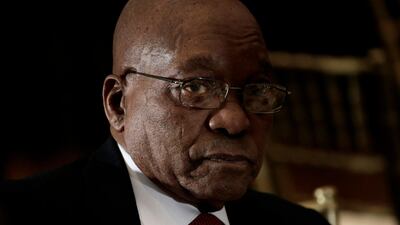An Indian state-owned bank is to close its operations in South Africa following allegations it facilitated murky financial transactions involving president Jacob Zuma and the wealthy Gupta business family.
Bank of Baroda, a 109-year-old bank headquartered in Mumbai, told the South African Reserve Bank (Sarb) on Monday about its plans to withdraw from the country. It comes after Bank of Baroda was fined 11 million rand (Dh3.4m) in June last year for failing to verify the source of deposits made by the three Gupta brothers, a family of Indian origin known for its close ties to Mr Zuma.
The bank has also come under further investigation as part of a larger government probe into the relationship between the Guptas and Mr Zuma, as the president faces mounting pressure to step down amid corruption charges.
“The registrar [of banks], which is part of the South African Reserve Bank, is in discussions with the Bank of Baroda to ensure its orderly withdrawal from South Africa so that no depositor is disadvantaged," Sarb said on Monday.
Bank of Baroda confirmed last week it was facing a probe by Sarb and that it was "actively co-operating and supporting these investigations”.
____________
Read more:
Zuma presidency close to its end as deal to stand down is finalised
Editorial: Political crisis grips South Africa as Zuma holds on amid calls for change
Beginning of the end for the Guptas' hold on South Africa
____________
The bank — which opened its first branch in South Africa in 1997 — will stop taking new deposits and giving out new loans as of March 1 and end all operations 30 days later.
The company did not respond to requests for comment from The National.
The Gupta brothers, who moved to South Africa in the mid-1990s, opened their first account with Bank of Baroda in 2005. As they acquired both wealth and political connections, their empire grew to include computer technology, mines, and telecommunications. They earned lucrative government contracts from Mr Zuma’s government — allegedly in return for kickbacks to the president and his family.
The brothers had tens of bank accounts open with multiple banks in South Africa. But between 2015 and 2017, the country's four biggest banks, along with Bank of China, closed all accounts the Guptas held with them over fears of money laundering and amid corruption investigations.
By December 2017, Bank of Baroda was the only bank still serving the family. At that time, court documents show the brothers and their affiliated companies had at least 35 accounts open with the bank.
After the company was fined last June, Bank of Baroda also tried to terminate the Guptas’ accounts. But the family sued to prevent this. In court, the bank said that in the 10 months leading up to July 2017, 36 suspicious transactions — with a total value of 4.25 billion rand — had been flagged on the brothers' accounts.
Then, as the case progressed, a civil society group named Organisation Undoing Tax Abuse (Outa) told the court that Bank of Baroda held roughly 1.75bn rand in trusts associated with mines operated by the Guptas. Those funds had been earmarked for environmental rehabilitation, Outa said, but the brothers had used them to pay back other loans.
Outa succeeded in having these funds frozen in September last year, the group's chief executive, Wayne Duvenage, said on Monday. It was important that “the Guptas are not able to use the bank’s closure to move those [funds] or the funds in their other accounts out of the country”, he added.
Last week, a fresh investigation by the Hindustan Times newspaper and South Africa's amaBhungane Centre for Investigative Journalism revealed that in 2010 Bank of Baroda offered a loan for a house purchased in the name of Mr Zuma's fourth wife. The bank then allowed the Guptas to pay off the loan, with instalments made via a chain of transfers through the accounts of Gupta-operated trusts and investment firms.
Devangshu Datta, a Delhi-based financial markets analysts, said the bank’s departure from South Africa would have likely been spurred by a desire “to get out … before something comes out in the investigation, for which it could be held liable to great penalties”.
Despite the controversy, he predicted that the embarrassment to the Indian government itself would be “mild”.
“Although [the government's] the majority shareholder, it would be able to distance itself from operational decisions made by the bank in South Africa,” he said.
“They’ll find a couple of scapegoats, probably South African citizens, and chuck them under the bus. Nobody would blame the government of India directly for this.”

